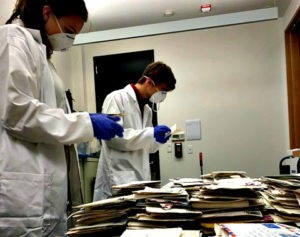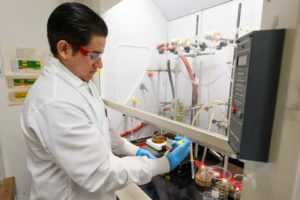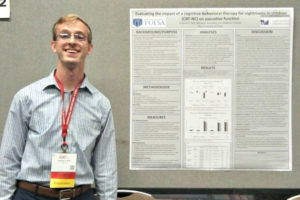The Tulsa Undergraduate Research Challenge (TURC) is one of The University of Tulsa’s most celebrated programs for providing undergraduate students with dynamic projects that advance research, support scholarship and enrich the community. Students from every college participate in year-round TURC research endeavors that fuel the curiosity of their minds and challenge the possibilities of discovery.
The following student projects showcase the diversity and value of TURC research and mentorship.
Maureen Haynes, senior, sociology and biology
 Maureen Haynes of Tulsa began her freshman year at TU as a mechanical engineering student, but an intro-level sociology class persuaded her to switch majors. Later, as a sociology student, she realized she missed studying the natural sciences and working in a laboratory, so she added biology as a second major. Haynes conducted research with Associate Professor of Mechanical Engineering Michael Keller in high school as a Junior TURC student and then as a TU student. She worked with graduate students to develop and rigorously test methods for the synthesis of microencapsulated magnetic nanoparticles designed to self-sense damage in synthetics.
Maureen Haynes of Tulsa began her freshman year at TU as a mechanical engineering student, but an intro-level sociology class persuaded her to switch majors. Later, as a sociology student, she realized she missed studying the natural sciences and working in a laboratory, so she added biology as a second major. Haynes conducted research with Associate Professor of Mechanical Engineering Michael Keller in high school as a Junior TURC student and then as a TU student. She worked with graduate students to develop and rigorously test methods for the synthesis of microencapsulated magnetic nanoparticles designed to self-sense damage in synthetics.
Haynes’ sociology TURC research involved researching the narrative experiences of Oklahoma’s public school teachers, which ultimately evolved into her senior thesis. She conducted in-depth interviews with teachers from across the state before and after Oklahoma’s historic teacher walkout in 2018. She coded for similarities and analyzed how they presented their profession, work and politics surrounding the education field. Haynes presented her research findings in a 2019 TEDxUTulsa talk “What Oklahoma’s Protesting Teachers Can Teach Us.”
 Her third TURC research component included an independent research project with Assistant Professor of Biology Matthew Toomey to study the metabolic conversion of yellow and red carotenoids in the avian visual system. Haynes also participated in the 2019 National Science Foundation Research Experiences for Undergraduates (NSF REU) program by examining the metagenomics of animal mortality composting through sophisticated sequencing platforms in genomics.
Her third TURC research component included an independent research project with Assistant Professor of Biology Matthew Toomey to study the metabolic conversion of yellow and red carotenoids in the avian visual system. Haynes also participated in the 2019 National Science Foundation Research Experiences for Undergraduates (NSF REU) program by examining the metagenomics of animal mortality composting through sophisticated sequencing platforms in genomics.
While her research has spanned a broad scope of subject matters, Haynes explained there are common themes. “These experiences solidified my adoration for the research process and how collaboration across people, disciplines and students yields powerful scientific findings. I love the research process and the research community here at TU.”
Nathan Blue, senior, English
 Nathan Blue’s TURC research project involves helping with cleaning, rehousing, digitizing and documenting the metadata of fan letters sent to musician Bob Dylan. Many of the letters have never been opened and were written at a pivotal time in Dylan’s career — following a motorcycle crash the singer survived in the summer of 1966. “These letters are an unprecedented glimpse into pop and rock fandoms at a time before magazines dedicated to rock music criticism like Rolling Stone came about,” Blue said. “Through our metadata documentation, these letters will become a wellspring of insight into mass fandom in the 1960s.”
Nathan Blue’s TURC research project involves helping with cleaning, rehousing, digitizing and documenting the metadata of fan letters sent to musician Bob Dylan. Many of the letters have never been opened and were written at a pivotal time in Dylan’s career — following a motorcycle crash the singer survived in the summer of 1966. “These letters are an unprecedented glimpse into pop and rock fandoms at a time before magazines dedicated to rock music criticism like Rolling Stone came about,” Blue said. “Through our metadata documentation, these letters will become a wellspring of insight into mass fandom in the 1960s.”
Blue became infatuated with Dylan’s music and its cultural impact in high school, eventually transferring from Tulsa Community College to TU in hopes of getting involved with the TU Institute for Bob Dylan Studies. He works closely with Sean Latham, institute director and English professor; Kate Blalack, lead archivist at the Woody Guthrie Center; and Mark Davidson, manager of the Bob Dylan Archive at TU’s Helmerich Center for American Research. “My research has taught me more about music fandom than I thought possible,” Blue commented.
He plans to continue studying the Dylan fan letters while pursuing a master’s in English literature at TU.
Luis Juarez, senior, chemical engineering
 For the past two summers, Luis Juarez has studied silicon dioxide (SiO2), the main component of sand, for potential new optoelectronic technologies. He and Associate Professor of Chemistry Gabriel LeBlanc explored how the electrodeposition method for obtaining purity c-Si from SiO2, coupled with temperature ionic liquids, could significantly reduce the cost of obtaining c-Si necessary for the production of solar cells, computer chips and smartphone chips. The process could also reduce greenhouse gas emissions.
For the past two summers, Luis Juarez has studied silicon dioxide (SiO2), the main component of sand, for potential new optoelectronic technologies. He and Associate Professor of Chemistry Gabriel LeBlanc explored how the electrodeposition method for obtaining purity c-Si from SiO2, coupled with temperature ionic liquids, could significantly reduce the cost of obtaining c-Si necessary for the production of solar cells, computer chips and smartphone chips. The process could also reduce greenhouse gas emissions.
“What caught my attention with this project was the impact it could have on the world,” Juarez explained. “We could increase the production of solar cells/panels as well as other new technologies that required c-Si while reducing the amount of energy required for c-Si production and pollutants.”
The project has taught him the importance of green chemistry and how new methods of obtaining c-Si for solar panels will help incorporate solar energy into our daily lives. After graduation, he plans to work in the pharmaceutical, environmental or energy sectors of the chemical engineering industry.
Andrew Helt, senior, psychology
 For his TURC project, Andrew Helt partnered with Associate Professor of Psychology Lisa Cromer and a group of graduate students to develop new forms of therapy to treat nightmares in children. He and doctoral student Mollie Rischard found that inhibition and set-shifting may improve with treatment. “Helping kids cope with nightmares through relaxation strategies, helpful sleep habits and changing the script of their dreams to make them less scary could also potentially help them change from recess to math class more effectively or suppress an impulse to distract their classmates,” Helt stated.
For his TURC project, Andrew Helt partnered with Associate Professor of Psychology Lisa Cromer and a group of graduate students to develop new forms of therapy to treat nightmares in children. He and doctoral student Mollie Rischard found that inhibition and set-shifting may improve with treatment. “Helping kids cope with nightmares through relaxation strategies, helpful sleep habits and changing the script of their dreams to make them less scary could also potentially help them change from recess to math class more effectively or suppress an impulse to distract their classmates,” Helt stated.
After screening for children’s nightmares at a local psychiatry clinic, he also began to wonder why more families were not taking advantage of free sleep treatment. Helt and doctoral student Jack Stimson interviewed caregivers via phone to learn why more children did not seek treatment; for some, the nightmares subsided on their own while others chose to learn more about their options. “Thanks to ownership of a project as an undergraduate, I’ve come to enjoy research far more than I expected, and I’ve started thinking about a career in research,” Helt explained. “I’m grateful for the role TURC has played in that journey.”
Learn more about how to support TURC students by contacting Natalie Adams at natalie-adams@utulsa.edu.






